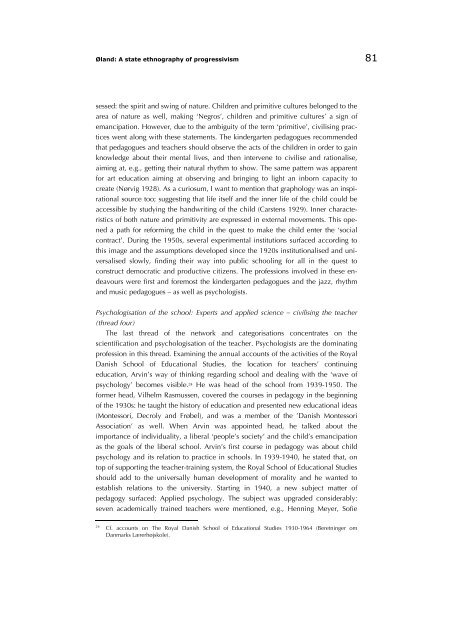Download - Praktisk Grunde
Download - Praktisk Grunde
Download - Praktisk Grunde
You also want an ePaper? Increase the reach of your titles
YUMPU automatically turns print PDFs into web optimized ePapers that Google loves.
Øland: A state ethnography of progressivism 81<br />
sessed: the spirit and swing of nature. Children and primitive cultures belonged to the<br />
area of nature as well, making ‘Negros’, children and primitive cultures’ a sign of<br />
emancipation. However, due to the ambiguity of the term ‘primitive’, civilising prac-<br />
tices went along with these statements. The kindergarten pedagogues recommended<br />
that pedagogues and teachers should observe the acts of the children in order to gain<br />
knowledge about their mental lives, and then intervene to civilise and rationalise,<br />
aiming at, e.g., getting their natural rhythm to show. The same pattern was apparent<br />
for art education aiming at observing and bringing to light an inborn capacity to<br />
create (Nørvig 1928). As a curiosum, I want to mention that graphology was an inspi-<br />
rational source too; suggesting that life itself and the inner life of the child could be<br />
accessible by studying the handwriting of the child (Carstens 1929). Inner characte-<br />
ristics of both nature and primitivity are expressed in external movements. This ope-<br />
ned a path for reforming the child in the quest to make the child enter the ‘social<br />
contract’. During the 1950s, several experimental institutions surfaced according to<br />
this image and the assumptions developed since the 1920s institutionalised and uni-<br />
versalised slowly, finding their way into public schooling for all in the quest to<br />
construct democratic and productive citizens. The professions involved in these en-<br />
deavours were first and foremost the kindergarten pedagogues and the jazz, rhythm<br />
and music pedagogues – as well as psychologists.<br />
Psychologisation of the school: Experts and applied science – civilising the teacher<br />
(thread four)<br />
The last thread of the network and categorisations concentrates on the<br />
scientification and psychologisation of the teacher. Psychologists are the dominating<br />
profession in this thread. Examining the annual accounts of the activities of the Royal<br />
Danish School of Educational Studies, the location for teachers’ continuing<br />
education, Arvin’s way of thinking regarding school and dealing with the ‘wave of<br />
psychology’ becomes visible. 24 He was head of the school from 1939-1950. The<br />
former head, Vilhelm Rasmussen, covered the courses in pedagogy in the beginning<br />
of the 1930s: he taught the history of education and presented new educational ideas<br />
(Montessori, Decroly and Frøbel), and was a member of the ’Danish Montessori<br />
Association’ as well. When Arvin was appointed head, he talked about the<br />
importance of individuality, a liberal ‘people’s society’ and the child’s emancipation<br />
as the goals of the liberal school. Arvin’s first course in pedagogy was about child<br />
psychology and its relation to practice in schools. In 1939-1940, he stated that, on<br />
top of supporting the teacher-training system, the Royal School of Educational Studies<br />
should add to the universally human development of morality and he wanted to<br />
establish relations to the university. Starting in 1940, a new subject matter of<br />
pedagogy surfaced: Applied psychology. The subject was upgraded considerably:<br />
seven academically trained teachers were mentioned, e.g., Henning Meyer, Sofie<br />
24 Cf. accounts on The Royal Danish School of Educational Studies 1930-1964 (Beretninger om<br />
Danmarks Lærerhøjskole).



